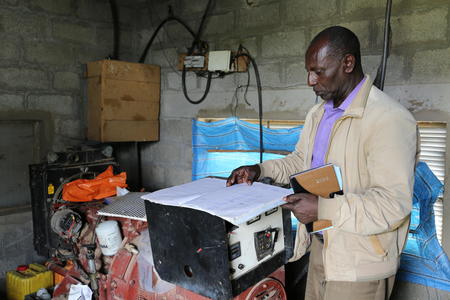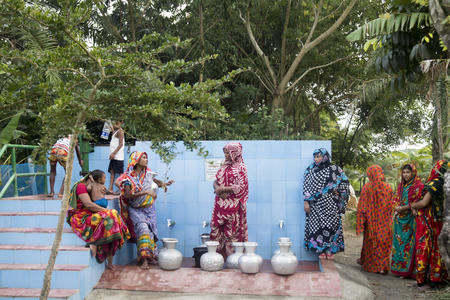UN75: Sustainable Engineering in Action. Creating an enabling environment for lasting water and sanitation.

To mark the 75th year of the UN and progress in engineering sustainability during this time, we contributed to the Institute of Civil Engineering (ICE) book UN75: Sustainable Engineering in Action. Vincent Casey discusses how we are working to strengthen the enabling environment for lasting water and sanitation services in low-income countries, where financial and human capital are in short supply.
Universal access to clean water, decent sanitation and good hygiene (WASH) is fundamental to progress in all areas of sustainable development. Ending extreme poverty and building a healthier, fairer and more productive world for everyone, everywhere can only be realised when these essentials are available to all.
Sustainable Development Goal 6 is one of the most interconnected goals – improved access to WASH is a basic human right, giving people in remote communities an equal chance to be healthy, educated and financially secure. But, at current rates of progress, it will be 2131 until everyone in least-developed countries has safely managed water – more than 100 years behind schedule.
Creating lasting WASH change
We use a whole-system way of working to bring about lasting change in communities and countries across the globe by demonstrating service models and infrastructure relevant for the context. We do this in the following ways:
- Partnership with local organisations – governments and civil society organisations.
- Thought leadership about how to achieve lasting water and sanitation gains more generally.
- Practice advocacy and policy advocacy, and campaigning for the necessary conditions to be in place for the work to be sustained.
- Capacity development – required to strengthen planning, monitoring, financing and service management.
- Behaviour change aimed at bringing about necessary WASH behaviours.
- Accountability and empowerment to help give people a voice and to strengthen their call for better services.
Sustainability challenges
Water supply and sanitation infrastructure are often introduced into resource-scarce environments where the financial and human capital needed to sustain service levels are in short supply. This presents several sustainability challenges that must be overcome if investments in infrastructure are to deliver value for money and long-term benefits to poor and marginalised people.
The changing climate is making life even harder for poor communities already struggling to access clean water. We must navigate sustainability challenges and strengthen the enabling environment for lasting water and sanitation service provision.
Types of sustainability challenges include:
- Social factors – such as willingness to pay for services.
- Environmental factors – ecosystem destruction can affect the amount of water available and water quality.
- Institutional and legal barriers – often there may not be an enabling policy environment for tariffs or services to be continued.
- Skills, capacity and technical issues – these are mostly linked to certain technical solutions being inappropriate for the context.
- Financial
– Often the finance available for major maintenance and replacement of major parts is not budgeted for by local government, service providers or national government.
– There are costs associated with the institutions, people and skills needed to keep services running.
– There is another significant cost associated with regulation and policy development and monitoring.
System thinking and WASH sustainability
As the world’s largest civil society organisation focused solely on WASH, we have built a deep understanding of the issues that face communities living without these basic services, and of the solutions needed. Sustainable access to clean water, good sanitation and hygiene are the building blocks to a better future for all.
Increasingly, we have been using systems thinking to design programmes and our advocacy strategies aimed at encouraging decision makers to make changes needed for sustainability.
By using a whole-system approach in our programmatic work, we can identify different actors – such as local government, national government and civil society organisations, communities and individuals – who play key roles in the system in ensuring services continue to operate.
We can also look at different factors like financing, monitoring, planning, accountability, institution and arrangements that are needed to keep the service running. There are linkages or interactions between these different actors and factors that we must consider when we’re looking at a system – for example, power dynamics.
But there are also barriers that we face in systems. It’s those barriers where efforts must be targeted, to remove them or to reach a situation in which the issue identified is no longer a problem.
Looking at problems in this way is a valuable means for us to really unpack how to move forward and try to address barriers to sustainability.
Collective impact to ensure sustainability
We’ve found that all systems-change programmes have to deploy a technique of adaptive management. Our vision of access to clean water, decent toilets and good hygiene for everyone, everywhere will remain fixed throughout a programme, but the way we get there needs to be flexible, because there are always unforeseen issues.
Having the right people and expertise on the ground in the communities in which we work is essential, so we can build the future we want to see – a future based on reliable access to clean water and building local skills and capacities.
And it’s necessary to work in one location until the system is strong enough to ensure sustainability. This can’t be achieved by one actor or partnership; collective impact is essential.
UN75: Sustainable Engineering in Action presents stories of the development of engineering innovation and engineering sustainability as a mindset within the built environment sector. Download the digital version here.
Vincent Casey is WaterAid's Senior Manager – Water. Follow him on Twitter at @vinnycasey2
Top image: Sughra with a water pump in the villlage of Muhammad Urs Sehejo, Sindh Province, Pakistan. We installed the pump was installed as part of the SusWASH programme, funded by the H&M Foundation.





